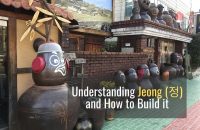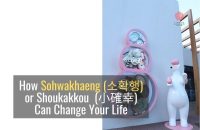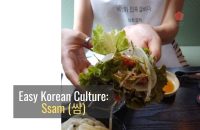This post covers the deeper meaning of noonchi (nunchi) in English.
It includes:
- examples
- when it comes in handy
- how to develop noonchi
I’ve had a fascination with noonchi for a few decades and learned from the best.

Quick Summary
- Noonchi literally means eye-measure and refers to reading the room or just having social sense.
- It’s important to learn how to read between the lines in South Korea.
- Noonchi is all about speed as Koreans say you have “fast” noonchi.
Noonchi means many things including “eye-measure”, reading the room, or just having social sense.
Noonchi is one of my favorite parts of Korean culture. It requires you to be present and mindful. Noonchi is a great skill to have when others lack focus. It’s like a hidden world that only a few can see.
What does noonchi mean?

Noonchi (눈치) is a broad concept that literally means “eye-measure”. It includes:
- intuition
- sense
- perception
- wit
- reading the room
- taking a hint
- giving a hint
Most commonly, it’s a way to gauge people’s thoughts and feelings based on their behavior, tone, body language and situation.
Examples are:
- 눈치를 채다 (noonchi-leul chae-da, meaning taking a hint): Noticing your friend is having a bad day, so you try to cheer them up.
- 눈치가 있다/없다 (noonchi-gah itda/eopda, meaning someone has/doesn’t have noonchi): Describing someone as not having noonchi is derogatory and is done when they miss social cues.
Noonchi can also mean an attitude and mannerism that reveals someone’s thoughts.
Examples:
- 눈치를 주다 (noonchi-leul ju-da, meaning giving a hint): Giving someone the side-eye when they’re doing something wrong.
- 눈치를 보다 (noonchi-leul bo-da, meaning reading noonchi): When you’re trying to leave work, you check if the boss is around.
Insider Tip
Many things in Korean life aren’t said and are implied instead.
It’s important to learn how to read between the lines.
Anyone can use noonchi, all they have to do is listen and observe.

Essential facts about Noonchi
Korea has a high-context culture (고맥락 문화), meaning many things are communicated non-verbally.
Koreans have shared experiences such as men serving in the military and women having to cook during holidays. They can read into things that are easy to miss for others.
The earliest mention of Noonchi first appears in the 17th century, but it’s likely a much older concept.
Like many things in Korea, noonchi is all about speed. Koreans say you have “fast” noonchi (눈치가 빠르다), not “good” noonchi (눈치가 좋다).
Noonchi is half of all social life
Korean saying
Korean business culture is based on interpersonal relationships, which can be fostered with the help of noonchi.
Most people feel that you either have noonchi or you don’t.
I believe that everyone has some level of noonchi whether they know it or not. It’s a life skill that you can actually develop and use in any country. Like being able to see better in the dark, all it takes is some practice.
Examples of Noonchi in everyday life
- Noticing which side people stand on the escalator to avoid getting pushed from behind.
- Looking at different subway cars to see which one’s less crowded, so you can grab a seat.
- Knowing when your host wants you to leave at the end of night when they look tired or keep saying, “how nice it’s been to catch up” and “look at the time”.
- Looking for people packing up their things on a bus so you can stand in front of them to take their seat when they get off.
- If a man or woman looks back after passing you on the street, they’re usually interested in you. Or, you’re dressed really funny.
- Noting a woman touching their hair while talking to you as a sign of attraction.
- When someone in a group says something funny, the person who looks at you while laughing generally likes you.
How Noonchi can improve your life
This skill transcends culture and can help improve your people skills.
Noonchi can be used anywhere, even in English-speaking countries like the US, UK, Canada and Australia.
It can even the playing field when you’re dealing with a power imbalance.
It can build confidence, especially for introverts.
Noonchi can improve harmony in your life with others.
It will make you more present and mindful.
It can give you an advantage at work, in business and during negotiations.
Subscribe for
exclusive info on Korea
Cons of Noonchi
Moderation is always a good rule to follow in life. Noonchi is no different and relying on it too much might take a toll on your communication skills.
Overusing noonchi might lead you to start verbalizing less.
It can make you self-conscious or fixate on what others are doing, instead of focusing on what you need.
You’ll expect others to be able to do the same thing. It’s important to remember that not everyone uses this superpower.
Noonchi can lead you astray sometimes, since it requires intuition. It’s best to treat it as a hypothesis you can test with a question.
In large congested cities like Seoul, it’s good to be able to turn it off or you might drain your battery.
Noonchi can cause others to make assumptions about you. Try to specify when someone has misjudged the situation.
How to develop Noonchi
For people you’re talking to:
- Lose your preconceived notions while interacting with them.
- While listening to someone, ask yourself what they feel, what they think and what they want.
- Pay attention to body language such as posture and hand gestures.
- Listen to voice pitch, volume and intonation.
- Look at facial cues such as dark circles under eyes, unwashed hair and make-up coverage to gauge how tired someone is.
- Guess their mood and what they want to accomplish that day.
- Confirm by asking.
In public places:
- Go to a public place and observe people.
- Listen and watch carefully.
- Let your mind flow and allow stimuli to enter.
- Try to guess people’s ages, background, occupation, conversation topic etc.
For situations:
- Take into account external factors such as weather and location.
- Look at how much traffic there is when deciding to take public transport or a taxi.
- Look at how crowded a restaurant is, how clean it is and how busy the staff are to decide if it’s a good idea to eat there.
- Look at how emotional/drunk a crowd is to decide if you should leave.
When to practice Noonchi
You can practice this skill when:
- you’re riding the subway or bus and everyone is glued to their smartphones
- you’re waiting for someone to show up
- everyone is drunk at a bar or club
- at a café or restaurant
Noonchi Tips!
- Use noonchi when your boss is stressed to commiserate and build rapport.
- Use noonchi when you travel to a new country and don’t know all the unspoken rules like whether to make small talk or not.
- When in doubt, ask.
- Koreans believe “가만히 있으면 중간은 간다 (if you stay still or do nothing, you’ll be in the middle)”. So, when in doubt, do or say nothing. This is recommended in the military or at a company.
My experience with Noonchi
I got my first taste of noonchi in K-town, Los Angeles when I was 18 years old. My friends taught me the “noonchi” drinking game where you say the next number in sequence. I was pretty good at this since it didn’t involve intense math or “rock, scissor, paper”.
After moving to South Korea, it realized how important the concept was in everyday life. Something simple like noticing who’s about to leave their seat on a crowded bus or subway then standing in front of them so you can sit down makes your hour-long commute easier. Also, being able to spot cult members trying to recruit you or crazy people can save a lot of trouble.
Reading the room during meetings to match the tone can make you look like a team player as well.
Knowing when some has had too much to drink or is in a bad mood can also give you time to remove yourself from the situation.
Over time, I was able to improve my noonchi with just a little bit of interest and effort.
Noonchi has enriched my life, but I always use it with caution. It can be inaccurate at times and take too much energy.
What are the characteristics of people with really fast Noonchi?
- They recognize changes in other people’s emotions or mood, just by looking at faces.
- They can see the true intention of others, including hidden words and behaviors.
- They get distressed and frustrated from finding out too much when they don’t want to know everything.
- They start pretending not to know because they’ll get tired if they get involved.
- They get into the habit of pretending not to know.
- They try to hide their quick noonchi.
- They have the foresight to recognize weird/crazy people, even when others think they’re nice.
- They get startled when others say “why do you pretend not to have noonchi?”
Noonchi vs Nunchi?
Both mean the same thing, but “nunchi” is the correct spelling according to romanization rules, while “noonchi” is more accurate according to how the word sounds.
Nunchi is technically right, while noonchi feels better.
Did we miss anything?
Let us know your thoughts on noonchi in the comments!





